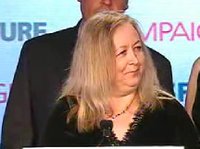I visited my son’s public school this afternoon.
It was depressing. The rules a new principal had promised to enforce rigidly in the fall were being flouted and ignored in the spring. Dress code? Quiet in the hall? Getting to class on time?
One of the teachers was furious. Why should those who get to class on time be penalized in favor of those who arrive late? My son shrugged. I was more concerned with teachers who seemed more interested in kids’ deference than their performance or effort.
The room remained tense until the teacher said, "I don’t understand about this No Child Left Behind. You can’t treat everyone the same. Some want to learn, some don’t. Some can learn more than others." It’s treating sponges like rocks.
My son shrugged again. It’s the public school system, he said. And it is. (That’s the neighborhood where my son’s school lies. The man in the foreground, Sam Massell, is the self-styled "Mayor of Buckhead" and was the last white Mayor of Atlanta in the early 1970s.)
The problem isn’t just a lack of respect among students. Everyone
must be educated, including the disrespectful. And it isn’t just
exhaustion among teachers. Many (like my own brother) are conscientious
and gifted, but so many are needed and the pay is so meager, the
conditions so poor that it drives you crazy or drives you out.
The problem is us, you and me, all of us. We don’t value public
schools. In the South, most of us don’t even send our children there.
In the neighborhood where my son’s school is located, fewer than 1 in
10 kids are in the public system. As a result an area that is 90% white
has schools which are 90% black or Hispanic.
Based on my personal experience I can’t recommend that change.
Fact is we don’t value anything with the word "public" in it. Public
schools, public hospitals, public parks, public transit, public streets. We’ve spent an
entire generation telling ourselves, and one another, that there is
what you can buy, which should be whatever you can pretend to afford,
and what is public, which is by definition second-rate.
The 1965 Watts Riot,
and the riots which followed it, gave birth to this attitude. Hatred
and fear of the other, based on race or based on class, didn’t have to
be stoked by politicians like George Wallace and Spiro Agnew. It was in
us, really in our parents, and ready to be lit like tinder, which the
riots did.
I told the teacher today that Katrina was
a different turning point. It made us realize we’re all in the same
boat, and that boat is sinking. It showed us the consequences of our
hatred and fear. It held a mirror up to those attitudes which started
after Watts, that hatred of the word "public," and it shamed us. Many
of us, anyway. Enough to shatter the myths and values which grew out of
Watts, and force millions to consider their own complicity.
A key part of that consideration, or reconsideration, should focus on the word public. Frederick Law Olmsted was asked what he wanted his grand city parks to say to future generations. "Look, we did this for you" was his reply.
My generation has done little, in its time on Earth, for those
generations yet-unborn. We have done little for anyone’s children but
our own. We have done as little as possible for those among us whom God
made different, save blame them for the consequences of those
differences. We have spent the last 40 years turning the word public
into an epithet.
Our public parks have become homeless shelters. Our public housing
has been torn down. Our public schools have become dumping grounds. Our
public centers are now private shopping malls, where the public rights
our forefathers died for mean very little. The only "big idea" conservatives have is to sell-off the roads and sell lanes to the highest bidders.
We, the People have spent a generation running away, into gated
communities, into distant suburbs, and we live our public lives
privately, alone.
Until that changes, and unless that changes, we can’t solve
anything. We must once again hang together, because we are all now
hanging separately.














from my European/German point of view, that’s so depressing. It makes me value what I take for granted here more, seeing how fragile it is in other circumstances.
from my European/German point of view, that’s so depressing. It makes me value what I take for granted here more, seeing how fragile it is in other circumstances.